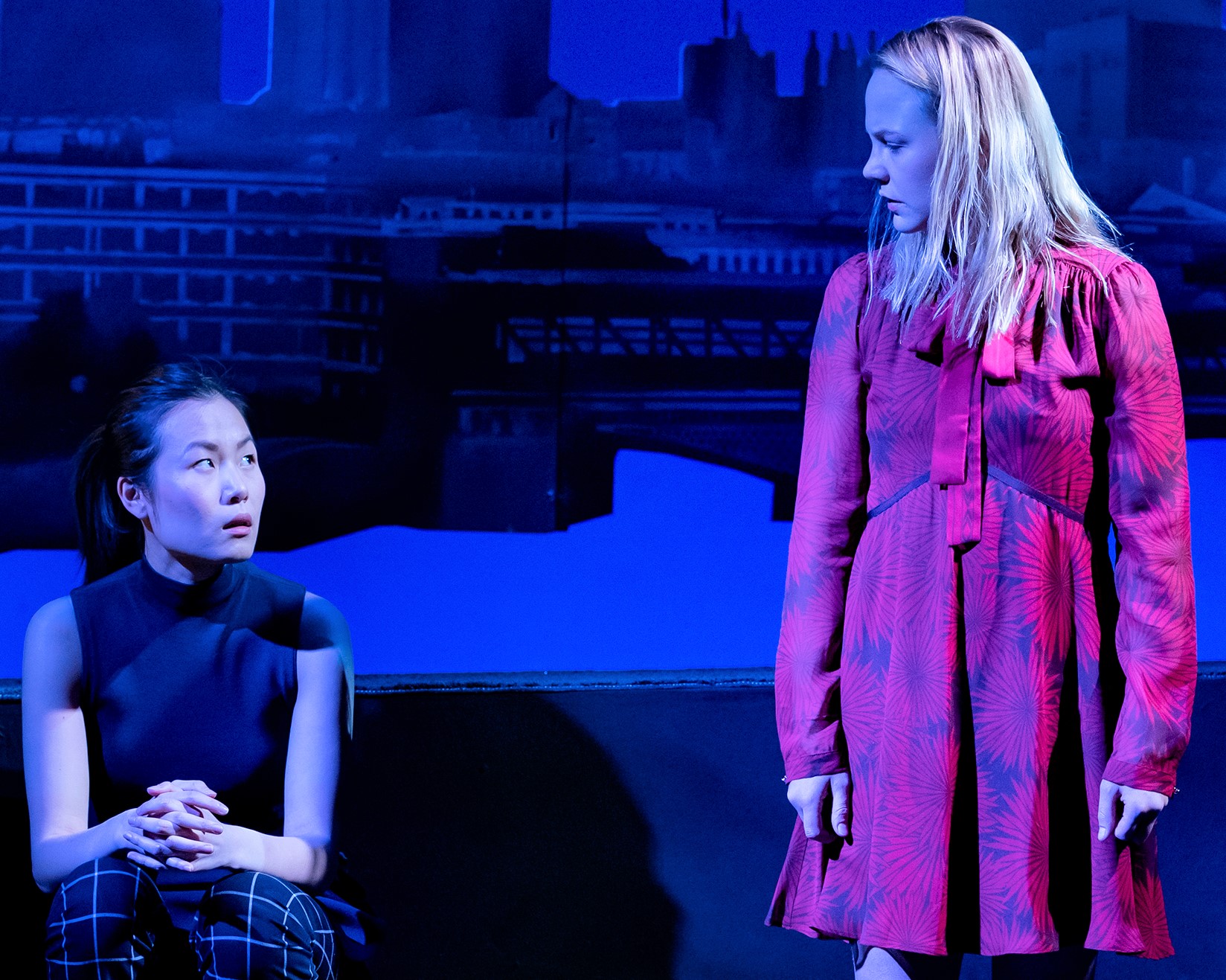Fans of Tom Stoppard who are used to the fizzy humor of Travesties, Rosencrantz and Guildenstern Are Dead, or Arcadia should be cautioned that The Hard Problem finds him in his other mode, tackling serious issues with less levity, as he did in The Coast of Utopia and The Real Thing. This time around the paramount concern is the title phrase used by scientists: how does consciousness come about? Connected to it are notions of altruism vs. egoism, with doses of coincidence, conscience, evolution, divinity, business ethics and other meaty subjects thrown in. And yet there are still moments of humor in Jack O’Brien’s fascinating production of this twisty play—a brainiac’s sumptuous meal laid out for the layman.
The playwright begins with an amusing bit of misdirection, as a man and woman debate what appears to be her plea in a case of jewel theft that she is involved in. Soon, though, it’s apparent that they’re engaging in game theory, specifically, the Prisoner’s Dilemma. The woman, Hilary (Adelaide Clemens), is trying to decide the best way to proceed. Her companion, Spike (Chris O’Shea), is her tutor, and he is trying to instill in her the necessity of admitting nothing, a survival strategy that will be familiar to anyone who has watched a police show on TV. “Two rational prisoners will betray each other even though they know they would have done better to trust each other,” he explains. The exercise is to prepare Hilary for a job interview at the Krohl Institute, which studies brain science.
Karoline Xu (left) is Bo and Adelaide Clemens is Hilary in Tom Stoppard’s The Hard Problem. Top: Clemens with Chris O’Shea as Spike.
In Hilary, Stoppard has, unusually for him, written a fascinating female character who carries the story. Clemens invests her with anguish, politeness, uncertainty and decency—all of which run counter to Spike’s hard-nosed ruthlessness. O’Shea’s Spike is also a casual sexual liaison for Hilary, and O’Shea offsets his good looks by imbuing the transactional Spike with a genteel chill.
Hilary gets the job at Krohl while her principal rival, Amal (Eshan Bajpay), is rejected. But after Amal draws the attention of Krohl himself (Jon Tenney, who alternates ruthless telephone conversations with moments of near-tenderness with his teenage daughter Cathy), he gets a job on the business side of the company. In exploring how the brain works, the Krohl Institute scientists hope to explain the nature of consciousness; however, Krohl, a billionaire hedge-fund manager, is only interested in ways the science can help him corner or disrupt business markets.
Hilary’s reluctance to embrace the mercenary tenets that Krohl, Spike, and Amal follow is due to her having given up a child for adoption when she was a teenager; the emotional trauma of her actions leads her to prayer and belief in a supreme being. The atheistic Spike, however, finds prayer a useless indulgence. A likable devil’s advocate, he moves out of her orbit, only to return later on. But while he’s there, the debate is lively:
Spike: It’s pathetic to rely on a supreme being to underwrite what you call your values. Why are you afraid of making your own?
Hilary: You don’t claim to make your own. What’s the difference between a supreme being and being programmed by your biology?
Spike: Freedom. I can override the programming.
Other characters come into play: Julia (Nina Grollman), an old school friend of Hilary’s, and her partner Ursula (Tara Summers), who works at Krohl and gives Hilary advice to get her through that first interview. And Leo (Robert Petkoff), who hires her and mentors her. Most important is perhaps Bo (Karoline Xu), who becomes Hilary’s assistant and has a theory of her own that she wants to pursue with Hilary’s backing.
Jon Tenney plays a billionaire hedge fund manager and Katie Beth Hall is his adopted daughter in The Hard Problem. Photographs by Paul Kolnik.
In Stoppard’s hands, the characters’ motives are always clear even when the intellectual demands on the audience are at their fiercest.
Hilary: I haven’t written anything which isn’t in plain sight. What is to be done with the sublime if you’re proud to be a materialist? To save the appearance of value, no theory is too unlikely, no idea too far-out to float so long as it sounds like science … elementary particles with teeny-weeny consciousness; or a cosmos with attitude; or the life of the mind as the software of a biological computer. These are desperate measures, Spike!
But after Hilary, in an altruistic move, supports a theory of Bo’s for which Bo, a math whiz, has provided statistics, things take an unexpected turn, and Hilary’s roller-coaster ride at Krohl comes to an end, albeit with a delicate emotional coda. As a playwright of ideas, Stoppard has no peer, and The Hard Problem, while it requires listening closely, is not hard to watch.
Tom Stoppard’s The Hard Problem plays through Jan. 6 at Lincoln Center’s Mitzi Newhouse Theater (150 W. 65th St.). Evening performances are at 8 p.m. Tuesday through Saturday; matinees are at 2 p.m. Wednesday and Saturday and at 3 p.m. Sunday. For tickets and information, call Telecharge at (212) 239-6200 or visit lct.org.









